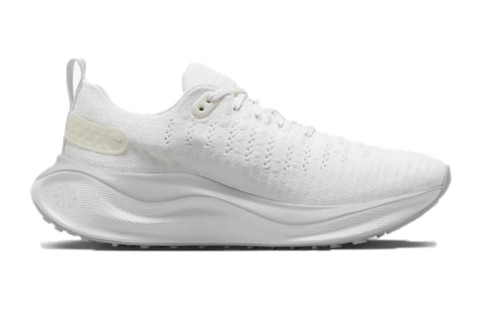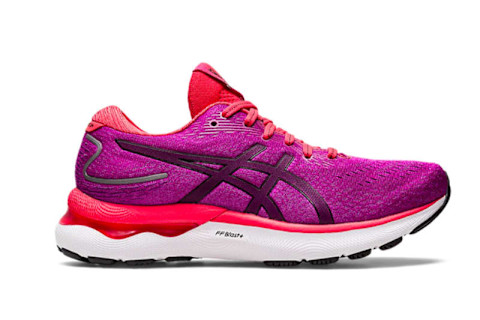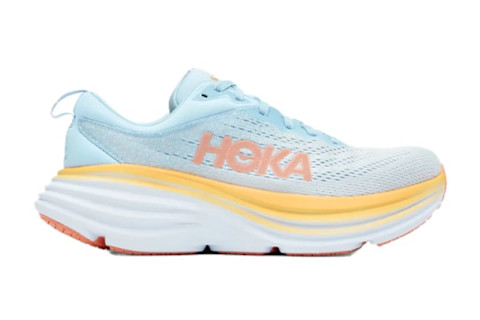
No matter your experience level, the right pair of running shoes is key for lasting comfort, injury prevention, and performance. Once you've done the research, picked a winning pair, and ramped up your training, you may begin wondering, how long do running shoes last?
According to surgical podiatrist Nelya Lobkova, how long running shoes last depends on factors such as how often you run, how many miles you cover, the types of surfaces run on, and (of course) the specific shoes you've chosen to wear.
Keep reading for Lobkova's take on how often you should replace running shoes, plus answers to all the other footwear questions running through your mind.
Why is it important to replace your shoes?
Lobkova says replacing your shoes is important because the cushioned foam in the midsole compresses over time. When this happens, the shoe no longer offers the support or rebound it had previously.
"Think of the midsole like a balloon that slowly deflates over time; it's not something visible to the eye," she explains. "You should keep track of the age of your running shoes and how many miles you've run in them."
As shoe support wanes, you become more susceptible to injury—so it's critical that you replace your running shoes when they become worn down. Research backs this, too, with a systematic review of 63 studies indicating that softer, thicker midsoles help reduce impact and minimize shock while running1.
How often should you replace running shoes?
There is no hard-and-fast rule here, but Lobkova recommends replacing running shoes sometime between 300 and 600 miles.
Yes, it's a wide range—but this can vary depending on a number of factors, including the type of shoes you wear, the surface you run on, your weight, and how often you run.
For example, if you're a heavier runner or you run on tougher terrain, you might need to replace your shoes more often. If you're a lighter runner and only lace up occasionally, you'll likely be able to get away with wearing your shoes for longer without replacing them.
A few of the best running shoes
Signs your running shoes need to be replaced
Per Lobkova, there are a few signs that indicate it's time to invest in a new pair of running shoes, including:
- Wear and tear in the upper material (such as holes in the mesh or when the foot is no longer held securely over the sole)
- The rubber of the outsole is worn down
- The midsole feels hard and unresponsive
- You're experiencing new foot pain after running
When pain enters the picture, your best bet is visiting a podiatrist to determine whether your shoes are to blame or if there's an underlying cause.
How to make running shoes last longer
There are a few things you can do to elongate the life span of your running shoes, including:
- Rotating between two (or more) pairs of shoes: This will give each pair a chance to rest in between runs.
- Cleaning your shoes regularly: Doing so can help remove dirt and debris that will ultimately wear down the materials. (Learn more about cleaning your shoes here.)
- Store your shoes in a cool, dry place: This, too, can help combat the elements (e.g., direct sunlight or humid conditions) that can eventually cause premature wear and tear on your shoes.
- Keeping your running shoes for running: Lobkova says you should avoid wearing your running shoes for day-to-day activities—and we agree, as this will cause them to wear down faster.
- Changing the direction of your run: Podiatrist Robert Kornfeld, DPM, says changing direction each time you run will foster slower and more even wear and tear.
What to do with old running shoes
We're all about sustainability at mindbodygreen—so let's make sure we're not just sending old shoes to a landfill! Instead, consider one of the below alternatives:
- Donate them: There are a number of organizations that collect and donate shoes to people in need.
- Recycle them: Some companies offer local or national recycling programs and initiatives. For example, Nike's Reuse-A-Shoe program collects footwear and uses it to make a sustainable shoe material the brand calls Nike Grind.
- Reuse them: If old running shoes are still in good condition, you can repurpose them for other uses. One of our favorites is using old running sneakers as gardening shoes (perk: you don't have to worry about dirtying them up).
Whatever you choose to do with your old running sneakers, we strongly advise against throwing them into the trash. Shoes can take anywhere from 20 to 100 years to decompose in a landfill, so it's best to find another life for them.
A few of the best running shoes
How many pairs of running shoes should you have?
The number of running shoes you should have depends on a few factors:
- How often you run
- How many miles you run (shorter distance or long distance)
- The type of terrain you run on (road running, trail running, or track running)
- Your training goals
- Your budget
If you're a casual runner who runs only a few times a week, you should be able to get away with owning one pair of running shoes. If you're a more serious runner who trains multiple times a week, we suggest having an extra pair on hand so you can alternate the shoes to increase their longevity.
If you're training for a marathon or another race, you might want to consider purchasing a pair of racing shoes. These are typically lighter and faster than training shoes, but they may not be durable enough for consistent wear.
FAQ:
Do running shoes wear out quickly?
How quickly running shoes wear out depends on several factors, including the type of shoe you're wearing, the surface you typically run on, your running style, your weight, and how often you run.
According to Lobkova, running sneakers should last for 300 to 600 miles, but some can hold up longer.
Do more expensive running shoes last longer?
More expensive running shoes don't necessarily last longer than affordable ones. The durability of a pair of running shoes depends on its materials, construction, and the way the shoe is used. Pay attention to these factors when making your decision.
Is it OK to wear running shoes casually?
Lobkova advises against wearing running shoes casually if you're an avid runner.
"Wear running shoes only while running, especially if you run more than 3 miles per week," she says. "However, light weekly jogging/running under 3 miles a week will age running shoes slowly, so there's no harm in wearing them casually when walking."
Kornfeld caveats this by adding that "Patients who use custom-molded orthotics can wear their running shoes as often as they wish as long as they are comfortable."
The takeaway
Whether you're wearing ultra-cushioned sneakers, zero-drop shoes, or something in between, make sure to keep track of your mileage. Running shoes can last up to 600 miles, but it really depends on the type of shoe you wear, the surface you run on, your weight, and how often you run. When in doubt, we recommend chatting with a podiatrist for personalized advice.




